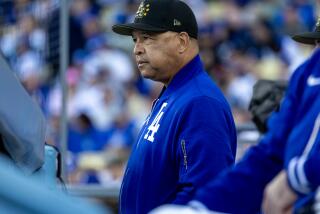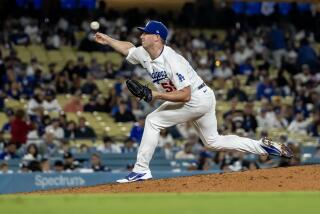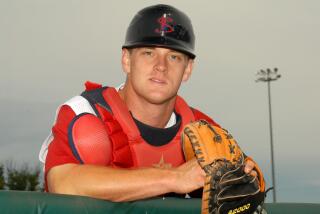Starting Over, Again : Alan Wiggins, Dogged by a Troubled Past, Tries to Establish a Future With Baltimore
- Share via
You figure a guy like Alan Wiggins would be a big advocate of fresh starts. After all, he has had more second chances than a spoiled rich kid in a private school.
He was released by the Angels just one year after they selected him in the first round of the 1977 free-agent draft, but signed as a free agent the next year with the Dodgers. The Padres drafted him out of the Los Angeles organization in 1980 (he wasn’t one of the 40 players the Dodgers protected, despite stealing 120 bases at Lodi and being named the Player Most Likely to Succeed in the Majors by California League managers).
He had his share of problems in San Diego and his second trip to a drug rehabilitation center April 27, 1985, meant his last trip to the plate in a Padres’ uniform. He had played his last game for the Padres against the Braves two days earlier.
He’s still playing major league baseball, but don’t expect the Baltimore Oriole second baseman to speak glowingly of his good fortune.
“There’s no such thing as a fresh start,” Wiggins says. “Especially not with this thing called the media. Baltimore’s a new place . . . a different place, but I’m still the person I always was. The successes and failures of the past are always with you.”
Lest anyone forget, Wiggins keeps bringing back the past with new adventures into success and failure.
He arrived in Baltimore in July of 1985 and the fans seemed willing to forget his previous transgressions. Or at least overlook them. He hit .285 and stole 30 bases in 76 games, but the cheers soon turned to boos when Wiggins stopped running out ground balls, started acting as if bending to field a grounder was beyond the call of duty and stopped talking to the press, the coaching staff and finally even his teammates.
Wiggins became a recluse and spent most of last season in his Baltimore hotel room. Always a loner in the clubhouse, he thrives on the love provided by his family. He said the absence of his wife, Angie, and his two children, 5-year-old Cassandra and 1-year-old Alan, Jr., left him despondent and his performance suffered.
“The fans didn’t see the true me,” Wiggins told the Washington Post this spring. “They saw a guy who didn’t hustle, who dogged it down the line. They didn’t see a guy thrown into a strange city without his family.
“I’m not that type of player and I’d never been that type of player. I made errors, but I made them because my concentration wasn’t there. I was depressed and playing that way was my way of expressing it.”
So Wiggins and family left their home in Rancho Penasquitos and moved into a new house in a suburb of Baltimore.
With that problem solved, can it be assumed Wiggins now is streaking to first after hitting one-hoppers back to the pitcher, making diving stops in the field, exchanging light banter with his teammates and inviting writers to dinner?
Not exactly.
In fact, Wiggins barely went through the motions when Manager Earl Weaver ordered him to take extra grounders this spring. He feels grounders hit from a fungo bat and the real thing have nothing in common.
After striking out recently, Wiggins threw his bat into the dugout and it bounced off The Baltimore Beloved--shortstop Cal Ripken Jr.--who suggested to Wiggins if it happened again he would personally “break your (bleeping) back.”
He has alienated many of his teammates, most of whom subscribe to the If You Don’t Have Something Nice to Say, Don’t Say Anything (for print, anyway) Theory and offer a “no comment” for the record regarding Wiggins. One player, whom Orioles’ beat writers say was Wiggins’ last friend on the team, said, “I’ve tried everything with him, man. I give up.”
A week ago Tuesday, Detroit’s Dave Bergman pulled the hidden-ball trick to pick off Wiggins.
The next day Wiggins made three throwing errors, two in the eighth inning. After the inning, the nightly Baltimore scoreboard feature “Who Am I” where portions of an Oriole player’s face are revealed while the fans try to guess who is featured was--you guessed it--Wiggins.
The boos got louder and louder as more and more realized whose face was on the board.
After the game, an irate Wiggins said, “I have my family in the stands and it’s humiliating. I’ve done everything they’ve asked of me here. I’ve taken 60 drug tests and come up clean on every one.
“I’m hitting .285 (actually .265, at the time) and I’m producing. I didn’t ask to come to the great Baltimore Orioles, they wanted me. If they don’t want me then they should do something about it.”
Weaver hinted that they might.
“I don’t blame him for being upset about the picture. The timing was the worst I’ve seen. But Wiggins has had more chances than anyone who ever wore an Orioles’ uniform, more than Mike Cuellar and I gave Cuellar more chances than my first wife.
“Whether he gets another chance remains to be seen.”
Wiggins is talking to the media, although begrudgingly, these days. He said he was “asked to by a couple of individuals in the front office.”
“I was just tired of answering the same questions over and over,” he said. “But you can’t avoid the media, and they have their job to do. But the media needs the players more than the players need the media. We’re not running for office.
“All I ask is that they’re fair and quote me correctly . . . still, they’ll quote you correctly, then give an opinion and the public construes that as fact, or at least as a generally accepted opinion. And the little things get blown out of proportion.
“It seems like people in America are obsessed with reading about other people’s misfortunes. Look at the (National) Enquirer. Who wants to hear about an eight-legged baby? But it’s popular. It’s the same with baseball. It’s always so-and-so tested positive or so-and-so was late.”
All too often, Alan Wiggins was that so-and-so.
“I don’t care what anybody says, Alan Wiggins was absolutely the most valuable player in the National League in 1984.”
--Dick Williams, former Padre manager
In 1984, Wiggins made the transition from outfield to second base, got 154 hits, stole 70 bases and scored 106 runs. And Tony Gwynn hit .412 when Wiggins was on base. The Padres went to the World Series and Wiggins signed a four-year, $2.8-million contract.
A few months later, after Wiggins again was admitted to a drug rehabilitation center, the Padres didn’t think he was worth much anymore. Ballard Smith, the Padre club president, proclaimed that Wiggins would never again appear in a Padre uniform.
There was some question whether he would ever play pro ball again. But the Orioles, in dire need of both a second baseman and a leadoff hitter, were willing to part with two minor leaguers . . . as long as the Padres agreed to pay part of Wiggins’ contract if there were more drug problems.
The gamble appears to be paying off. After a slow start, Wiggins is hitting .253 with 28 runs scored, entering Thursday’s game. He may not be the most popular player in the clubhouse, but Ripken, Eddie Murray, Fred Lynn and Co. don’t mind seeing him out there on the basepaths.
“Being the leadoff hitter is a little different here than in San Diego, because this is a better ballclub,” Wiggins said. “We don’t usually need to scratch for one run. We can play even for a while and know we’ll get our runs.
“Every run is still important, but we’re not as pressed to create situations here because, after me and Lee Lacy, you’ve got five guys who are all capable of hitting 25 homers. I still have the green light (to steal), but I take fewer chances now.”
Predictably, the switch-hitting Wiggins wasn’t worried about his early-season problems despite a very unimpressive spring and the .193 batting average he took into May. Weaver saw things a bit differently though, and “rested” Wiggins on a couple of occasions in favor of another former Padre, Juan Bonilla.
“He got off to a real slow start,” Weaver explained. “Some of his line drives were being caught, sure, but, he wasn’t getting on base and there’s not much else he can do offensively.”
Wiggins figured Weaver was making a big mistake, but he wasn’t surprised. He says he has been “branded” because of his drug problems and expects to get a disproportionate share of the blame when things go wrong.
“I went 1 for 9 in the spring and they panicked,” he said. “All of a sudden, my job was up for grabs. Then we got off to a slow start. The whole team wasn’t playing well and my lack of production was magnified. I took the brunt of it, like it was all my fault, so he (Weaver) sat me down. But that’s OK, I wasn’t getting on so I couldn’t complain.
“I’ve been swinging the bat real well all year, though. In fact, I thought I was swinging the bat better in April. But now I’m getting some cheap hits and the line drives are falling in. Even when you hit the ball hard, you’ve only got about a 50-50 chance of getting a hit.
“It takes talent, but it helps to be lucky.”
No one would doubt that Alan Wiggins has the talent. At 28 years old, he has become one of the league’s premier leadoff hitters and certainly the best the Orioles have had since Don Buford.
And lucky? Well, there are many who think he should consider himself very fortunate to have had so many chances to showcase his talent.
More to Read
Go beyond the scoreboard
Get the latest on L.A.'s teams in the daily Sports Report newsletter.
You may occasionally receive promotional content from the Los Angeles Times.






